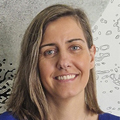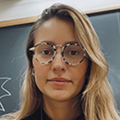This year at JEM, we are highlighting women in science by sharing their stories and amplifying their voices. In this Viewpoint, we hear from a cross section of women, across multiple research fields, discussing their science and the process of setting up a lab as an independent researcher. As well as being able to celebrate the positives of becoming an independent researcher, we would also like to use this platform to discuss the unique challenges they face as women scientists in their respective scientific environments. This Viewpoint is part of an ongoing series at JEM.
Pilar Dominguez
Chair of Excellence Labex SIGNALIFE, Head of Team 14: Cancer Epigenetics and Immunotherapy, Mediterranean Centre for Molecular Medicine (C3M), Nice, France

Since January 2023, I have been the head of the Cancer Epigenetics and Immunotherapy team at the Mediterranean Centre for Molecular Medicine (C3M) in Nice, France. Our group studies epigenetic mechanisms in hematological malignancies, integrating basic and translational approaches. My professional trajectory includes living in four different countries (Spain, USA, Australia, and now France) and having two children. My previous experience as a postdoc prepared me to become a principal investigator and set up my lab. However, as a woman and a mother I faced certain challenges that I had to learn to overcome, since there were not many female scientists in my circumstances and the academic system is still very linear in terms of career progression. But I realized that those situations could be opportunities to grow, and I found my own path to become a group leader. I am optimistic about the future, and I am excited to be able to continue my research while contributing to the achievement of gender equity.
Corinne Benakis
Junior group leader, Microbiome–Gut–Brain Axis Laboratory, Institute for Stroke and Dementia Research, University Hospital, LMU Munich, Munich, Germany

In my research group, we investigate the implications of the microbiota–gut–brain axis in stroke—an exciting yet relatively new field. As I climbed the ladder to become a group leader, I encountered the challenges of often being the only woman in the room, facing unconscious bias and a lack of role models. This could be discouraging, but I learned that achieving independence in science, ironically, requires support and collaborative work. I could not have made it without the guidance from my postdoc supervisors and mentors across the world, as well as unwavering support from my family, friends, and partner.
I established my lab in April 2020, facing the unique challenges of social distancing. Despite the obstacles we have encountered, I believe that the COVID generation of scientists is exceptionally innovative and knows how to adapt—essential qualities for research. I’m grateful for my dedicated team, and I try every day to pass on my passion for the gut–brain axis and a strong work ethic that, with time, will lead to new discoveries. Today, I am excited to serve as a role model for young women entering our field. Science thrives on diverse ideas, opinions, and perspectives.
Abby Overacre
Assistant Professor, Department of Immunology, University of Pittsburgh, UPMC Hillman Cancer Center, Pittsburgh, PA, USA

I am an Assistant Professor in the Department of Immunology at the University of Pittsburgh and the UPMC Hillman Cancer Center. My lab studies how the microbiome and immune system interact during tumorigenesis and immunotherapy treatment in hopes of identifying new therapeutic strategies. When I was a trainee, I was constantly told that various grants, journals, etc., were “extremely hard to get, but you can always try.” Thankfully, this feedback only fueled my ambition and determination to succeed. My response was (and continues to be), “Well, they have to give it to someone; why not me?” This has resulted in me achieving far more than I ever thought possible. I have had amazing mentors throughout my career, from my undergraduate research lab (Dr. Schroeder), graduate career (Dr. Vignali), and postdoctoral training (Dr. Hand), and they have always encouraged me to go for the biggest and best opportunities possible, and for that I am extremely grateful. My main piece of advice to young women scientists is: don’t take yourself out of the game—you are far more capable and talented than you realize.
Raffaella Di Micco
New York Stem Cell Foundation Robertson Investigator, San Raffaele Telethon Institute for Gene Therapy (SR-TIGET), San Raffaele Scientific Institute, Milan, Italy

I am a Group Leader at the San Raffaele Telethon Institute for Gene Therapy within the San Raffaele Hospital in Milan and a New York Stem Cell Foundation Robertson Investigator. Research in my lab aims at understanding mechanisms of stress responses in hematopoietic stem cells in the context of genetic engineering and during oncogenesis, with a particular focus on DNA damage and senescence-related programs. Since my early training, I have always been fascinated by fundamental questions of biology related to longevity and the preservation of genome stability. When I returned to my home country from postdoctoral training in the United States, I embarked on new research lines in the field of human hematopoiesis and faced the challenges of being new in the field, which included having difficulties in securing funding and recruiting the best trainees. Luckily, I was equipped with enough self-confidence, boldness, and perseverance to progress in my career and face the challenges of having more professional responsibilities. My success was also thanks to the unconditional support from my family, which as a woman scientist and a mother is arguably one of the most important things. It is also great to see how some institutions and funding agencies are currently supporting women’s careers, and my biggest inspirations are indeed fantastic women scientists who perfectly balance their professional lives with family responsibilities, creating a nurturing community. I still believe there are many stereotypes and biases to be faced to fill the representation gap and fully empower women in science, especially when it comes to top leadership positions, but I am positive that in the future, through education and active mentoring, we will witness more and more women thriving in science.
The best advice I received when I started my lab was to share my leadership and research vision with my trainees and make them feel part of a bigger mission. Mentorship is what I enjoy the most in my job; I love to witness trainees’ growth as humans and professionals and to guide them in their scientific endeavors. What fascinates me the most is that, despite hematopoietic stem cells having been used for decades for cell therapy applications, there is still a limited understanding of how these cells respond to genetic engineering and of the cellular barriers that need to be overcome for successful therapeutic applications. By developing a comprehensive map of the intricate complexity of hematopoietic stem cells, we are getting closer to understanding their molecular and functional heterogeneity. I hope that our research, at the intersection between stem cell and aging biology, in the next years will provide a new dimension of mechanisms allowing preservation and expansion of bona fide long-term repopulating stem cells for translational applications.
Carolina Lucas
Assistant Professor, Immunobiology Department and Center of Infection and Immunity, Yale University, New Haven, CT, USA

I am a researcher dedicated to understanding immune responses to emerging viruses. Setting up my lab has been a realized dream, though not without challenges. The best advice I received was to “embrace adaptability.” When studying emerging viruses, it’s crucial to quickly adapt to new findings. Also, accepting that many things are beyond your control and swiftly overcoming unforeseen hurdles is key. Inherent biases and the male-dominated nature of many professional settings pose significant challenges. While the onset of this journey can be daunting, laden with the weight of adapting to a new role and substantial responsibilities, it’s interspersed with moments of immense joy. The thrill of initiating your own projects, cultivating your space, and building your team is invigorating. A standout realization when setting up a lab is that you’re not alone; sharing the excitement of new experiments with your team and knowing they’ll stand by you through challenges is truly encouraging. Also, with every challenge comes resilience. Cultivating a supportive network has proven invaluable. I aspire to pave the way for future female scientists, following the footsteps of those who did the same for me.




